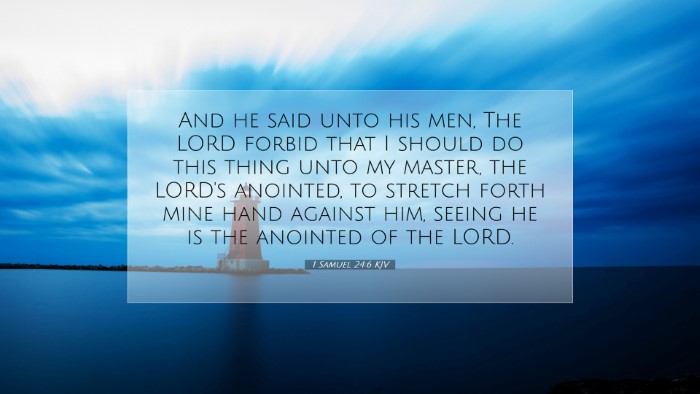Commentary on 1 Samuel 24:6
Bible Verse: "And he said unto his men, The LORD forbid that I should do this thing unto my master, the LORD's anointed, to stretch forth mine hand against him, seeing he is the anointed of the LORD."
Introduction
This verse is a profound moment in the narrative of David's rise to kingship and reflects deep moral and theological implications. As David refrains from harming King Saul, who has been pursuing him, we observe a crucial theme of divine authority and the respect owed to God's chosen leaders, even when they act unjustly. This commentary integrates insights from notable public domain sources to elucidate the biblical and practical significance of this passage for contemporary readers.
The Context of 1 Samuel 24
The broader context of this verse is essential for understanding its meaning. In 1 Samuel 24, David has the chance to kill Saul, who enters a cave where David is hiding. Saul’s pursuit of David stems from jealousy and fear, prompted by David’s popularity and God’s favor on him. David’s restraint in this situation highlights his character and fidelity to God’s principles.
Matthew Henry’s Insights
According to Matthew Henry, this moment demonstrates "David's piety and respect for divine order." Henry emphasizes that David's refusal to harm Saul underscores a critical aspect of godliness: the acknowledgment of God’s sovereign choice in appointing leaders. The phrase "the LORD's anointed" reiterates the sacred dignity attributed to rulers, which should not be taken lightly, even amidst their failings.
- Respect for Authority: Henry notes that David’s actions reflect a profound respect for God’s authority and appointment.
- The Test of Integrity: This situation serves as a moral test; David's integrity shines through as he prioritizes God's ways over revenge.
Albert Barnes’ Commentary
Albert Barnes elaborates on the implications of David’s statement regarding the anointed of the LORD. Barnes points out that this phrase signifies not only Saul’s position but also a critical theological understanding of divine anointing, which carries with it both authority and accountability.
- Divine Appointment: Barnes stresses that David recognizes Saul as divinely appointed despite Saul's aberrations, showcasing a tension between human authority and divine sanction.
- Faith and Providence: David's choice to spare Saul is also a statement of faith in God’s providence, suggesting that God ultimately holds sway over the outcomes of their conflict.
Adam Clarke’s Interpretation
Adam Clarke offers a detailed look at the emotional and spiritual dimensions of the interaction between David and Saul. He highlights the profound respect David holds for the office of the king and the seriousness with which he regards the concept of anointing.
- Spiritual Significance: Clarke notes that David's act of withholding violence against Saul demonstrates spiritual maturity and an understanding of God's plan.
- Compassion Over Retribution: David’s reaction speaks volumes about his character; he chooses compassion over personal vendetta, a theme prevalent throughout biblical texts.
The Theological Implications
The verse invites us to explore several theological themes, crucial for pastoral and scholarly reflection.
- Sovereignty of God: The narrative reinforces the sovereignty of God in the affairs of humanity, particularly in leadership. It compels readers to consider how God uses flawed individuals in significant roles.
- Divine Justice and Mercy: David’s restraint illustrates God’s mercy prevailing in human conflict. It also prompts discussion regarding the balance between justice and mercy in leadership.
- Respect for Leaders: The text encourages modern believers to maintain respect and prayerful attitudes towards their leaders, recognizing their authority as divinely orchestrated.
Practical Applications
This verse serves as a foundation for practical applications relevant to contemporary faith communities:
- Conflict Resolution: David’s response provides a model for handling conflict constructively without resorting to violence or personal vengeance.
- Leadership Ethics: Leaders today can learn from David’s example that integrity and reverence for God’s order are paramount, regardless of external pressures.
- Being a Witness: For those in faith communities, the call to be a witness of God’s kingdom requires exhibiting grace, respect, and compassion even towards those who oppose them.
Conclusion
1 Samuel 24:6 is more than a historical account; it encapsulates deep theological truths about divine authority and the nature of true leadership. David’s refusal to harm Saul is a testament to his commitment to God’s standards and illuminates the path for believers facing ethical dilemmas today. As we reflect on this passage, we are reminded of the importance of trusting in God’s justice and timing, and demonstrating the character of Christ in our interactions with others, especially those in authority.


